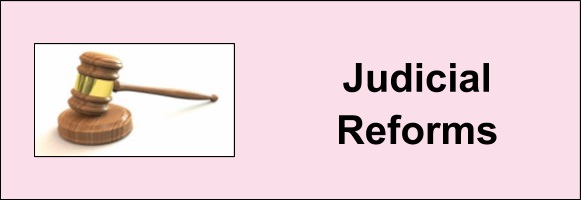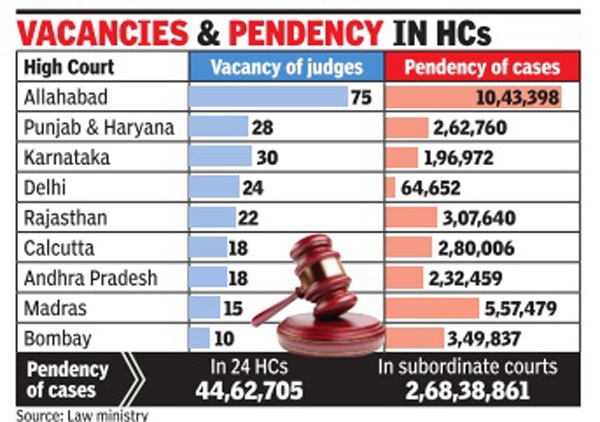Judicial Accountability and Judicial Reforms : Important Topics for UPSC Exams

Judicial Accountability and Judicial Reforms : Important Topics for UPSC Exams
Introduction
-
The Indian Judiciary plays an increasingly important role in the life and the governance of this country..
-
Recently CJI as the master of the roster with the sole prerogative to determine which Bench of judges gets to hear which cases comes under question.
-
Four senior judges of supreme court came in public and organized a press conference to tell that everything is not going fine inside the judiciary, they were mainly pointing on the CJI that he is allocating case to benches in arbitrary manner
Why judicial reforms and accountability
-
For ensuring speedy justice: Speedy justice is not only our fundamental right but also a most important requirement for maintaining the rule of law and delivering good governance.
-
Opaque internal structure founded on a combination of unquestioning trust in the office of CJI along with instinctive distaste for any interference by parliament or executive in judicial functioning
-
Judiciary as guardian of our constitution: Judicial accountability is more important, as decline of values in judiciary is far more dangerous than in any other organ of the government as judiciary has to act as the guardian of our constitution.
-
Virtually absolute power with court: the courts in India enjoy virtually absolute power than any Court in the world. So accountability is must.
-
To clear the backlog cases – more than 3 core cases are pending in judiciary there clearance needs holistic reform in the judiciary.
-
In its absence, the judicial system ends up serving the interests of the corrupt and the law-breakers.
Reforms Needed
-
Supreme Court act can be passed by parliament after consulting all stakeholders- judiciary, civil society, bar association and political opinion.
-
This act will restructure the supreme court into 3 division
-
Admission-special leave petition under article 136 will be heard by this bench comprising of 5 judges
-
Constitutional- 5 judges bench to deal with constitutional matter.
-
Appellate-rest 21 judges will be divided into 7 benches of 3 judge each to hear appeal against HC judgment.
-
Judges will be circulated among 3 division at particular interval.
-
By this act present crisis can be solved – coherency in SC decision as same 5 judge will listen to constitutional matter. CJI being master of roster issue will also be solved.
-
Timely appointment of judges –there should not be any vacancy in Courts.
Buy Printed Complete Study Materials for UPSC IAS PRELIMS Exam
Online Crash Course for UPSC PRE Exam
Concerns/challenges in judiciary
-
Allegation of corruption in the court.
-
No mechanism to look into the corruption charges on the judges.
-
Interference of CBI in the working of judiciary amounts to executive control over the judiciary, which goes against the basic principles of the constitution that is judicial independence
-
The chief justice constituting a 5 judge bench including himself when he is facing allegations ignores the primary principle that justice not only be done, but be seen to be done.
-
The use of Article 142 has also become a sign of immense judicial indiscipline Article 142 gives judges the power to do whatever it takes to secure justice.
-
Delay in disposal of cases is to a great extent responsible for the increase in crimes like rape, murder, looting, cheating and so on.
-
There are almost 30 million cases pending and it takes between 12 to 15 years for a judgment. In the meantime, Witnesses could die, turn hostile, go missing, or get killed.
-
In many cases, what is being dispensed as justice after so many years of litigation is flawed.
-
High no. of vacancy in judiciary impacts justice system

Way forward
-
The principle that the Chief Justice of India is the master of the roster must be re-examined and all the concerned raised by four judges of supreme court must be resolved.
-
Urgent reform is required to restore the moral authority of the Supreme Court
-
The primary principle is that justice not only be done, but be seen to be done, which always holds good.
-
Lot of care needs to be exercised so that the anti-corruption measures taken do not undermine. The independence of the judiciary.
-
Transparency in court proceedings and appointments of Judges.
-
Creation of a transparent, full-time independent judicial complaints commission to investigate complaints against judges.
-
Judicial system should be accessible and effective for the poor.
-
Use of information technology tools for better court/ time management.
-
Setting up an All India Judicial Services.
-
When judicial activism and review wades into policy making, sometimes its consequences can be disruptive. Therefore there has to be a fine balance between all the organs of state to uphold constitutionalism.
-
Cooperative constitutionalism is the responsibility of the three organs of the State to protect the Constitution.
MODEL QUESTIONS
1. Consider the following statements about High courts
-
It has original and appellate Jurisdiction
-
It enjoys the power of judicial review
-
It acts as court of record
Which of the statement(s) is/are correct?
(a) Only 1 and 3
(b) Only 2 and 3
(c) Only 1 and 2
(d) Only 1, 2 and 3
Correct answer: d
2. Who of the following decides the number of judges in a High Court?
(a) President
(b) Parliament
(c) Governor of the concerned state
(d) Legislature of the concerned state
Correct answer: a
Civil Services Mains Examination
Critically analyse why ensuring judicial reforms and accountability is need of hour for India. Also suggest steps which can be taken to bring reform in judiciary.

